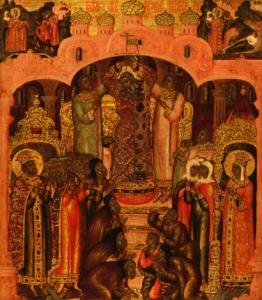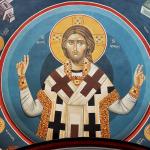
The cross is raised up both as a guide, indicating the way we should live our life, and also as a sign of love, divine and human. Christ upon the cross reveals to us the way we should live, that is, the way of self-giving love, showing us that it is the way which God’s love is actualized. It is for this reason when we take up the cross for ourselves, we should realize we do it, not out sadism, not out of some nihilistic intent to extinguish our existence, put to put into practice the way of love revealed by Christ:
The Cross is the symbol of Divine life in the Incarnation and the crucifixion – in the Holy Trinity in heaven and on earth. Therefore the Cross represents not only two separate reals that are connected by events along the path of the Incarnation, but also Divine being (bytie) itself as eternal sacrifice. [1]
This is why if we want to venerate or honor the cross, if we want to honor what Christ has done on the cross, if we want to be like Paul and boast in the cross (cf. Gal. 6:14), we are to do so by following the sign of the cross, that is, by embracing what the cross itself represents. Divine love is not some sort of self-enclosed love of where God has made no room for us. Rather, it is the open love of God for all creation, a love which is made available to us because the persons of the Trinity open themselves to us by denying all forms of self-attachment which would keep us distant or cut off from them.
Each person of the Trinity, and therefore, the Godhead empties themselves of all self-assertion, of all triumphal sense of superiority and therefore separation from what God has created. This is one of the many truths revealed to us in the cross. We have to embrace that love, engage it, and open ourselves to it in order to receive it; to do that, we must deny all the selfishness, all the self-centered attachments we have which lead us to consider ourselves superior to others. We are to go from being a fallen individual cut off from others, and therefore, cut from the divine life, to becoming a true person, someone who find themselves to be in a relationship with divine love, and through divine love, in a relationship with everyone and everything else in creation. Thus, we must take the example of love, revealed to us in the cross, and act with such self-giving love:
The cross of Christ is the power of love for Christ; without the cross there is no love for Him. And sacrifice is the power of love, and without the agony of the cross there is no Love. We must deny ourselves [Matt. 16:24], we must decrease [John 3:30] and despise ourselves, hide ourselves and trample ourselves so that there may be good for another, for one we love; and then from the earth of our souls the Lord will grow the white flowers of paradise, the anemones of suffering. [2]
When we believe ourselves to be only an individuated self, someone who is self-substantial, independent from everyone else, we think we need nothing from anyone else, even from God This is we end up undermining our true nature, for we are not individuals cut off from each other, but persons whose existence comes from others, whose existence keeps them connected with and relying upon others, and therefore, persons in relationships with others, including, and especially God. We are created out of love to share in and experience love and to live out our lives with that love. This is impossible so long as we are attached to ourselves.
The individuated self is a construction which we impose upon our personal existence; as long as we are focused on that construction, on the individuated self which tries to cut itself from all others, it begins to take on a life of its own, having us sacrifice all other things to it so it can persist. It will have us act in such a way to preserve itself, and this is why it often has us develop all kinds of pride, so that through such pride, we reject the love which is necessary for us to overcome it and reveal the person which it has tried to replace. For us to live as we were meant to live, to live in and through love, to experience all things in and through love, we must therefore deny that individuated self, to let it perish, which is why Jesus said, “If any man would come after me, let him deny himself and take up his cross and follow me. For whoever would save his life will lose it; and whoever loses his life for my sake and the gospel’s will save it” (Mk. 7:34b-35 RSV).
When we join ourselves to Christ in baptism, the barrier we have put up between us and the rest of creation, and between ourselves and God, is overcome. In that moment, we find ourselves to be a person in relationship with other persons, even as we find ourselves joined in and one with the body of Christ. Sadly, after our baptism, we can start rebuilding the individuated self, and the wall of separation it established to keep itself separate from everyone and everything else, and it seems most of us start to do so rather quickly. But having once found the individuated self overcome, and having received grace in the process, the person which lies underneath that self can and will use that grace to free itself, to counter what the fallen self wants to establish, so that the individuated self does not have to have the final say. That is, thanks to the way we have joined ourselves to Christ, we have entered into communion with others, finding the barrier we created to be permeable; grace comes through, giving us a way to help take it down again, until at last, we cast it away one final time and let it perish in the fires of divine love:
As we must live righteously all the time, so we must bear the cross all the time, for to all of us have been assigned our own crosses, and all of us carry them in our own way and in our own measure. There is one word for persecution, but not only one cause of struggle, and there is infinitely more danger in hidden traps than in an obvious enemy. [3]
The Christian way of life is the way of love. We must deny selfish individualism and any attempts to act in ways which cut ourselves off from our bonds with others, that is, any attempts to deny our personal relationship with others by substituting an individuated self for our person. To live righteously is to live a life of self-sacrificial love, not, of course, a life of personal destruction, of nihilistic self-hatred, but a life of love, giving others love so that we can truly live and thrive and experience the full glory of love.
[1] Sergius Bulgakov, The Eucharistic Sacrifice. Trans. Mark Roosien (Notre Dame, IN: University of Notre Dame Press, 2021), 28.
[2] Sergius Bulgakov. Spiritual Diary. Trans. Mark Roosien and Roberto J. De La Noval (Brooklyn, NY: Angelico Press, 2022), 82 [11/24.X.1924].
[3] St Leo the Great, Sermons. Trans. Jane Patricia Freeland CSJB and Agnes Josephine Conway SSJ (Washington, DC: CUA Press, 1996), 202 [Sermon 47].
Stay in touch! Like A Little Bit of Nothing on Facebook.
If you liked what you read, please consider sharing it with your friends and family!
N.B.: While I read comments to moderate them, I rarely respond to them. If I don’t respond to your comment directly, don’t assume I am unthankful for it. I appreciate it. But I want readers to feel free to ask questions, and hopefully, dialogue with each other. I have shared what I wanted to say, though some responses will get a brief reply by me, or, if I find it interesting and something I can engage fully, as the foundation for another post. I have had many posts inspired or improved upon thanks to my readers.













